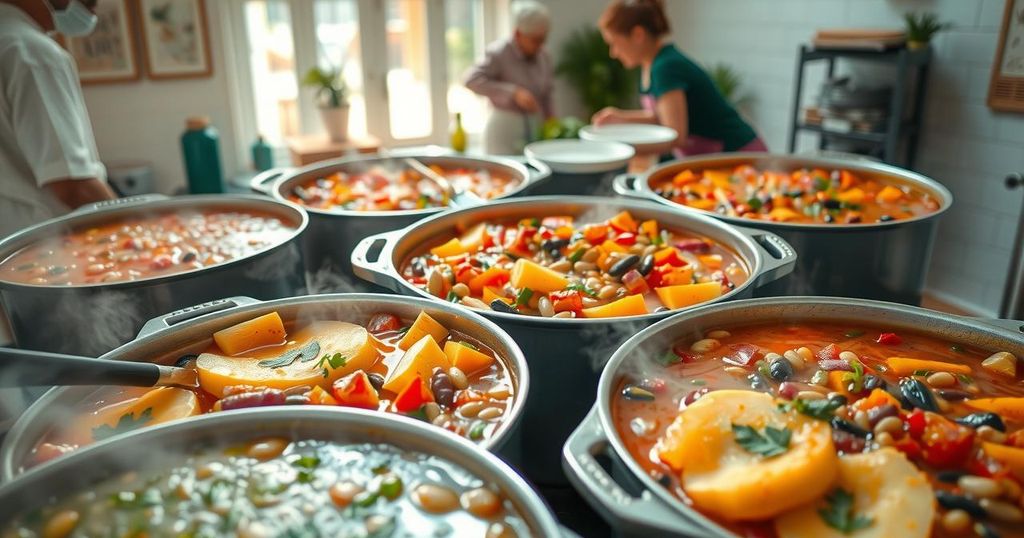Kazakh Cuisine: A Culinary Journey Reflecting Cultural Heritage
Kazakh cuisine, steeped in tradition, offers a blend of history and rich flavors deeply connected to the identity of the Kazakh people. Esteemed dining establishments like Auyl in Almaty and Qazaq Gourmet in Astana showcase traditional dishes such as beshbarmak, while emphasizing the importance of communal dining experiences. As the culinary landscape evolves, the revival of traditional recipes nurtures a renewed appreciation for Kazakh heritage, creating poignant connections to home.
Kazakh cuisine, rich in tradition and deeply connected to the identity of the Kazakh people, serves as a testament to their historical nomadic lifestyle. The Auyl restaurant in Almaty, recently recognized among the world’s most stunning dining establishments, encapsulates this spirit, offering guests both a culinary and visual journey through Kazakhstan’s diverse flavors. With horse meat as a fundamental ingredient, Kazakh dishes represent the nurturing sustenance vital for survival in a harsh climate, a cultural heritage sustained throughout generations. For those new to Kazakhstan, embracing the local cuisine is an essential part of the travel experience. While the prevalence of meat may initially overwhelm foreign visitors, it has been a cornerstone of Kazakh diets, especially before modern conveniences were introduced. As the nation has evolved, so too has its cuisine which has recently witnessed a resurgence of traditional dishes as Kazakhs explore their rich culinary heritage. The contemporary restaurant scene reflects this revival and is characterized by the incorporation of local ingredients combined with innovative cooking methods. Ayul restaurant stands out in Almaty, situated by the picturesque Shymbulak mountains. The establishment’s ambiance recreates a neo-nomadic lifestyle, evoking a sense of nostalgia and familiarity. Signature dishes such as baursak and balqaimaq illustrate the culinary fabric of Kazakhstan, while offerings like beshbarmak and horsemeat broth depict the warmth and comfort akin to family gatherings that are deeply rooted in Kazakh culture. Astana, the capital city, is home to Qazaq Gourmet where visitors can savor beshbarmak—a celebratory dish emblematic of important occasions in Kazakh life. This restaurant creates an environment that merges tradition with modernity, allowing patrons to appreciate the essence of Kazakh culture through its diverse and flavorful dishes. Another notable venue is Selfie, which takes a luxurious approach to Kazakh-inspired cuisine while showcasing stunning views of the cityscape. This establishment emphasizes the importance of local ingredients, presenting dishes that resonate with the identity and ambitions of Kazakhstan. Furthermore, the ice cream inspired by traditional Kazakh tea provides an enchanting experience, emphasizing the cultural significance of tea in social gatherings. Despite the array of exquisite dining experiences showcased across Kazakhstan, it is essential for visitors to connect with the local people. Sharing a meal in a traditional Kazakh home provides a unique insight into the culture, transforming standard ingredients into heartfelt dishes prepared by mothers and grandmothers. Kazakh cuisine is often best experienced in these intimate settings, highlighting food’s ability to foster connections and evoke a profound sense of belonging. Chef Evgeniy Chekanin affirms this sentiment, as he recounts his fondest memory of beshbarmak, created not in a high-end restaurant, but within the welcoming confines of a family home. This illustrates the lifelong bond Kazakhs share with food, reflecting their heritage and unwavering sense of home, wherever one may be.
The article explores the essence of Kazakh cuisine, showcasing its rich history and the intricate relationship between food and culture in Kazakhstan. With an emphasis on the significance of horse meat and traditional dishes, it reflects on how the culinary practices of Kazakh people were shaped by their nomadic lifestyle. The discussion highlights the transformation within the dining landscape of Kazakhstan, where modern establishments are rooting for a revival of traditional recipes and cultural significance in a contemporary context. This transition not only signifies resilience but also a newfound celebration of national identity through food, making it an essential aspect of the Kazakh experience.
In conclusion, Kazakh cuisine serves as a vibrant expression of the national identity, encapsulating historical traditions and cultural values within its dishes. Restaurants like Auyl and Qazaq Gourmet exemplify the blending of modern culinary techniques with traditional flavors, offering a glimpse into the rich gastronomical heritage of Kazakhstan. Moreover, the genuine warmth experienced when sharing homemade meals with local families further solidifies the notion that food is more than nutrition; it is a profound connection to home and identity cherished by the Kazakh people. Visitors to Kazakhstan are encouraged to embrace this culinary adventure and discover the heart of Kazakh culture through its food.
Original Source: astanatimes.com




Post Comment